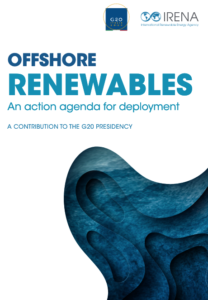Full Title: Offshore Renewables: An Action Agenda for Deployment
Author(s): International Renewable Energy Agency (IRENA)
Publisher(s): International Renewable Energy Agency (IRENA)
Publication Date: July 30, 2021
Full Text: Download Resource
Description (excerpt):
Transforming the energy sector requires a shift towards renewable energy sources. The world’s oceans are a source of abundant renewable energy, which can be tapped through offshore wind (with fixed and floating foundations, or airborne), floating solar photovoltaics (PV) and other emerging ocean energy technologies.
The G20 Italian presidency of 2021, acknowledging the importance of offshore renewables in the energy transition, commissioned IRENA to analyze and develop a proposed action agenda to foster offshore renewables deployment globally. Offshore renewables include offshore wind, ocean wave, tidal, thermal and salinity gradient technologies and floating solar PV.
To put the world on a climate-safe pathway, IRENA’s 1.5°C scenario foresees a massive growth in offshore wind, ocean energy and floating photovoltaic in the coming decades. Offshore wind for example would increase from 34 GW in 2020 to reach 380 GW by 2030 and more than 2,000 GW by 2050. Ocean energy would represent additional 350 GW of offshore renewable generation capacity by 2050.
Offshore renewables also has the potential to contribute to the SDG 14 on the conservation and sustainable use of oceans, coupling energy with blue economy activities like fishery, shipping, and tourism. A blue economy fuelled by offshore renewables would help islands and countries with coastal areas to meet their national goals aligned with the Paris Agreement, their Nationally Determined Contributions (NDCs) and the Sustainable Development Agenda for 2030.
The report includes 50 concrete actions that G20 countries may consider while defining their national strategies for offshore renewables. Suggested actions include strengthening an oceans governance according to the UN Law of the Sea, the proper integration of offshore renewables in national Marine Spatial Planning, and the provision of public revenue support and early planning for the needed infrastructure (e.g. underwater cables and grid connections).
